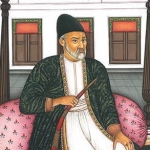William de la Pole, Duke of Suffolk: beheaded 1450
John Tiptoft, Earl of Worcester: beheaded 1470
Anthony Woodville, Earl Rivers: beheaded 1483
1
Processionals in the exemplary cave,
Benediction of shadows. Pomfret. London.
The voice fragrant with mannered humility,
With an equable contempt for this world,
‘In honorem Trinitatis’. Crash. The head
Struck down into a meaty conduit of blood.
So these dispose themselves to receive each
Pentecostal blow from axe or seraph,
Spattering block-straw with mortal residue.
Psalteries whine through the empyrean. Fire
Flares in the pit, ghosting upon stone
Creatures of such rampant state, vacuous
Ceremony of possession, restless
Habitation, no man’s dwelling-place.
2
For whom do we scrape our tribute of pain—
For none but the ritual king? We meditate
A rueful mystery; we are dying
To satisfy fat Caritas, those
Wiped jaws of stone. (Suppose all reconciled
By silent music; imagine the future
Flashed back at us, like steel against sun,
Ultimate recompense.) Recall the cold
Of Towton on Palm Sunday before dawn,
Wakefield, Tewkesbury: fastidious trumpets
Shrilling into the ruck; some trampled
Acres, parched, sodden or blanched by sleet,
Stuck with strange-postured dead. Recall the wind’s
Flurrying, darkness over the human mire.
3
They bespoke doomsday and they meant it by
god, their curved metal rimming the low ridge.
But few appearances are like this. Once
Every five hundred years a comet’s
Over-riding stillness might reveal men
In such array, livid and featureless,
With England crouched beastwise beneath it all.
‘Oh, that old northern business …’ A field
After battle utters its own sound
Which is like nothing on earth, but is earth.
Blindly the questing snail, vulnerable
Mole emerge, blindly we lie down, blindly
Among carnage the most delicate souls
Tup in their marriage-blood, gasping ‘Jesus’.
4
Let mind be more precious than soul; it will not
Endure. Soul grasps its price, begs its own peace,
Settles with tears and sweat, is possibly
Indestructible. That I can believe.
Though I would scorn the mere instinct of faith,
Expediency of assent, if I dared,
What I dare not is a waste history
Or void rule. Averroes, old heathen,
If only you had been right, if Intellect
Itself were absolute law, sufficient grace,
Our lives could be a myth of captivity
Which we might enter: an unpeopled region
Of ever new-fallen snow, a palace blazing
With perpetual silence as with torches.
5
As with torches we go, at wild Christmas,
When we revel in our atonement
Through thirty feasts of unction and slaughter,
So many things rest under consummate
Justice as though trumpets purified law,
Spikenard were the real essence of remorse.
The sky gathers up darkness. When we chant
‘Ora, ora pro nobis’ it is not
Seraphs who descend to pity but ourselves.
Those righteously-accused those vengeful
Racked on articulate looms indulge us
With lingering shows of pain, a flagrant
Tenderness of the damned for their own flesh:
6
My little son, when you could command marvels
Without mercy, outstare the wearisome
Dragon of sleep, I rejoiced above all—
A stranger well-received in your kingdom.
On those pristine fields I saw humankind
As it was named by the father; fabulous
Beasts rearing in stillness to be blessed.
The world’s real cries reached there, turbulence
From remote storms, rumour of solitudes,
A composed mystery. And so it ends.
Some parch for what they were; others are made
Blind to all but one vision, their necessity
To be reconciled. I believe in my
Abandonment, since it is what I have.
7
‘Prowess, vanity, mutual regard,
It seemed I stared at them, they at me.
That was the gorgon’s true and mortal gaze:
Averted conscience turned against itself.’
A hawk and a hawk-shadow. ‘At noon,
As the armies met, each mirrored the other;
Neither was outshone. So they flashed and vanished
And all that survived them was the stark ground
Of this pain. I made no sound, but once
I stiffened as though a remote cry
Had heralded my name. It was nothing …’
Reddish ice tinged the reeds; dislodged, a few
Feathers drifted across; carrion birds
Strutted upon the armour of the dead.
8
Not as we are but as we must appear,
Contractual ghosts of pity; not as we
Desire life but as they would have us live,
Set apart in timeless colloquy.
So it is required; so we bear witness,
Despite ourselves, to what is beyond us,
Each distant sphere of harmony forever
Poised, unanswerable. If it is without
Consequence when we vaunt and suffer, or
If it is not, all echoes are the same
In such eternity. Then tell me, love,
How that should comfort us—or anyone
Dragged half-unnerved out of this worldly place,
Crying to the end ‘I have not finished’.

















Comment form: